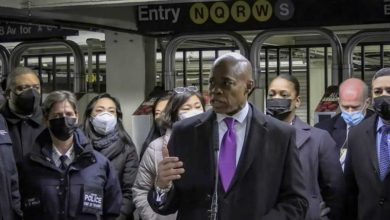

People who have kept their distance from friends and family over the last year are starting to gather again as they get vaccinated against coronavirus.But a Des Moines, Iowa, man is feeling helpless. Michael Nairn’s fiancée and 9-month-old son, Noah, are stuck on another continent with no end in sight."In the beginning, it was really sad for me because I felt like I was just a video screen to him, he didn't understand. And I was thinking, 'How is my son ever gonna know me? How are we gonna bond? Then when we do see each other, is he even gonna want to come to me?'" Nairn said. Noah lives in the Philippines with his mother, Maria Corazon. She wants to move to Iowa, but the pandemic has put her visa process on hold. Maria went through her pregnancy without her fiancée by her side. "It's very difficult for me, because I'm a first-time mom," Corazon said. Daily video chats will have to do for Nairn and his daughter McKaylee, who are both waiting to welcome Noah and his mother home. "I'm always on the U.S. Embassy website," Nairn said. "Every like 15 to 20 days they post an update and it's always 'alright, we're going to be closed again for another month.' And 'OK, we're going to be closed again.'" The U.S. Department of State told sister station KCCI visa services are suspended at the U.S. Embassy in the Philippines because the pandemic has limited its visa processing power. Presidential proclamations have also limited travel over the last year.In a statement provided to KCCI, the U.S. Department of State said there's no timeline on when all embassies will be fully operating."I do understand that this is for everybody's health, but they need to make some type of exceptions for families like this," Nairn said. Sonia Parras Konrad is a human rights attorney based in Des Moines."There are no exceptions for faster processing," Konrad said. "You know, if there are some humanitarian extreme circumstances, you can bring that up."Konrad said situations like abuse, a child left alone or severe medical conditions are considered humanitarian extreme circumstances. Everyone else may have to wait.
People who have kept their distance from friends and family over the last year are starting to gather again as they get vaccinated against coronavirus.
But a Des Moines, Iowa, man is feeling helpless. Michael Nairn’s fiancée and 9-month-old son, Noah, are stuck on another continent with no end in sight.
"In the beginning, it was really sad for me because I felt like I was just a video screen to him, he didn't understand. And I was thinking, 'How is my son ever gonna know me? How are we gonna bond? Then when we do see each other, is he even gonna want to come to me?'" Nairn said.
Noah lives in the Philippines with his mother, Maria Corazon. She wants to move to Iowa, but the pandemic has put her visa process on hold.
Maria went through her pregnancy without her fiancée by her side.
"It's very difficult for me, because I'm a first-time mom," Corazon said.
Daily video chats will have to do for Nairn and his daughter McKaylee, who are both waiting to welcome Noah and his mother home.
"I'm always on the U.S. Embassy website," Nairn said. "Every like 15 to 20 days they post an update and it's always 'alright, we're going to be closed again for another month.' And 'OK, we're going to be closed again.'"
The U.S. Department of State told sister station KCCI visa services are suspended at the U.S. Embassy in the Philippines because the pandemic has limited its visa processing power. Presidential proclamations have also limited travel over the last year.
In a statement provided to KCCI, the U.S. Department of State said there's no timeline on when all embassies will be fully operating.
"I do understand that this is for everybody's health, but they need to make some type of exceptions for families like this," Nairn said.
Sonia Parras Konrad is a human rights attorney based in Des Moines.
"There are no exceptions for faster processing," Konrad said. "You know, if there are some humanitarian extreme circumstances, you can bring that up."
Konrad said situations like abuse, a child left alone or severe medical conditions are considered humanitarian extreme circumstances. Everyone else may have to wait.
Source link






